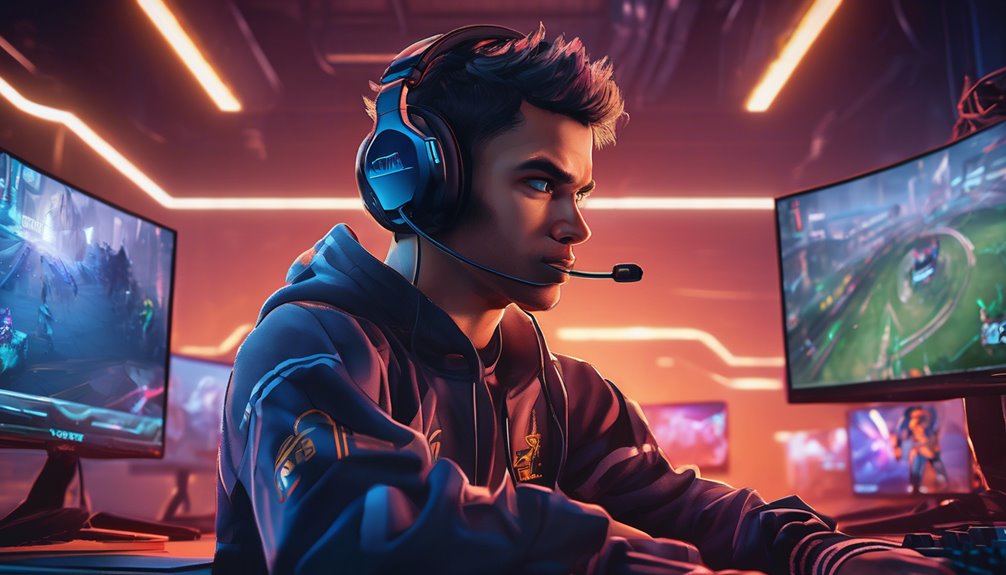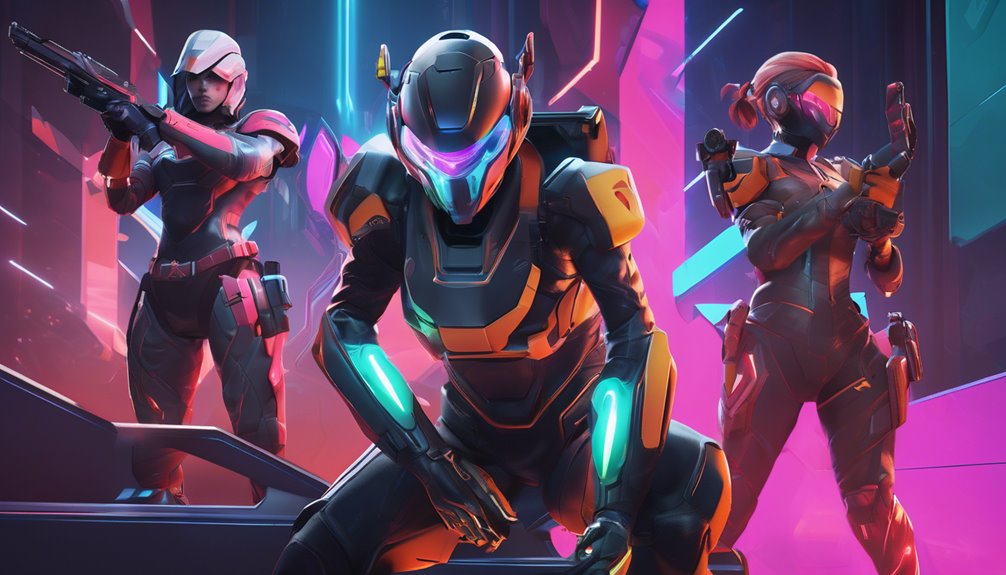Understanding the Importance of Placement Matches in Valorant
While you might be eager to jump into competitive play, understanding the importance of placement matches in Valorant is crucial for setting the right trajectory for your rank.
 Placement matches hold significant weight in determining your initial rank, as they assess your skill level against other players. Essentially, this is where the ranking system explanation comes into play. You’ll play a series of matches, typically five, which help the game gauge your abilities and match you with players of similar skill.
Placement matches hold significant weight in determining your initial rank, as they assess your skill level against other players. Essentially, this is where the ranking system explanation comes into play. You’ll play a series of matches, typically five, which help the game gauge your abilities and match you with players of similar skill.
The placement match significance lies in how these games not only influence your starting rank but also shape your competitive experience. A strong performance can launch you into a higher tier, while a less favorable showing might keep you in a lower bracket. Therefore, approaching these matches with focus and strategy is key, as they lay the groundwork for your competitive journey in Valorant.
Preparing Your Mindset for Competitive Play
As you gear up for competitive play in Valorant, cultivating the right mindset can make all the difference in your performance. A crucial mindset shift involves transitioning from a casual approach to one that emphasizes competitive focus. This means treating each match as an opportunity to improve and learn rather than just a chance to win.
Begin by setting specific goals for your matches—whether it’s improving your aim, communication, or game sense. Embrace the idea of constructive feedback; view losses as valuable lessons rather than setbacks. When you encounter challenges, remind yourself that resilience is key in competitive environments.
Additionally, cultivate a positive atmosphere by surrounding yourself with like-minded players who share your ambition. This not only reinforces your competitive focus but also enhances teamwork. Ultimately, a strong mindset will not only elevate your gameplay but also enrich your overall experience in Valorant’s competitive landscape.
Mastering Agent Selection and Composition
When it comes to competitive play in Valorant, mastering agent selection and team composition is crucial for maximizing your chances of victory. You need to consider agent synergy, which refers to how well agents complement each other’s abilities. For instance, pairing a smoke character like Omen with a duelist like Jett can create opportunities for aggressive plays while maintaining strategic control of the map.
Focus on balancing your team composition; you’ll want a mix of initiators, duelists, controllers, and sentinels. This balance allows for diverse tactics and adaptability during matches. Additionally, think about the map and the specific roles each agent can fulfill. A well-rounded team can easily counter opponents’ strategies and capitalize on weaknesses. Remember, the right combination not only enhances individual performance but also elevates the entire team's effectiveness, paving the way for a successful placement match experience.
Communicating Effectively With Your Team
Even the best team composition can falter without effective communication. To achieve optimal team synergy, you need to establish clear communication channels right from the start. This means using voice chat or text to share your strategies, call out enemy positions, and coordinate abilities. Don’t underestimate the power of concise information—short, direct messages can make a significant difference in fast-paced scenarios.
Encourage your teammates to engage in dialogue as well. A team that communicates openly can adapt more quickly to changing situations. For instance, if you notice an enemy strategy, relay that info to adjust your team’s approach on-the-fly. It’s also important to listen actively; understanding your teammates’ plans and concerns can lead to a more cohesive strategy.
Analyzing Map Strategies and Callouts
To secure victory in Valorant, mastering map strategies and key callouts is essential for effective map control. Understanding where to position yourself and how to communicate crucial locations can turn the tide of a match. Let’s break down the critical areas you need to focus on to enhance your team’s coordination and gameplay.
Effective Map Control
Mastering effective map control is crucial for success in Valorant, as it directly influences your team's ability to secure objectives and outmaneuver opponents. One key aspect is employing map control techniques, like early aggression and information gathering. By claiming specific zones, you can establish zone domination, limiting your opponent's movement options. Use utility to clear corners and deny vision, ensuring your team can hold advantageous positions. Communication is vital; coordinating with teammates to rotate and cover flanks enhances your control. Always be aware of potential enemy locations and adapt your strategies accordingly. Remember, strong map control not only enhances your team's defensive capabilities but also sets the stage for successful attacks, leading to a greater chance of victory.
Key Callout Locations
While it may seem simple, knowing key callout locations on each map can significantly enhance your team's coordination and strategic execution in Valorant. Mastering these map callouts helps you identify strategic positions for both offense and defense. Use communication cues to inform teammates of enemy spotting and potential threats. For effective site takes, familiarize yourself with critical locations, such as bomb sites and choke points. Don’t overlook navigation tips for flank routes and rotation paths, which can catch opponents off-guard. Your tactical awareness will improve as you learn to relay information swiftly, making it easier for your team to adapt and respond to changing situations. Invest time in mastering these callouts, and watch your team's performance soar.
Focusing on Individual Performance Metrics
As you dive into your Valorant placement matches, understanding your individual performance metrics can significantly impact your overall success. Focusing on these metrics not only aids in skill assessment but also fosters personal growth. Here are key areas to consider:
- Kill/Death Ratio: Gauges your effectiveness in engagements.
- Objective Plays: Measures your contributions to team goals.
- Economy Management: Assesses how well you manage in-game resources.
- Communication Efficiency: Evaluates your ability to convey important information.
- Role Fulfillment: Looks at how well you perform your designated individual role.
Adapting to Different Game Scenarios
Understanding how to adapt to different game scenarios is crucial for success in your Valorant placement matches. Each match presents unique challenges, and your ability to adjust your strategies can significantly impact the outcome. Whether you're defending or attacking, being aware of your surroundings and understanding your team's strengths can help you thrive.
Here's a quick reference table to help you think about various game scenarios and how you might adapt:
Game Scenario Adaptation Strategy
| Early Round Advantage | Play aggressively, take map control |
| Deficit Situation | Focus on teamwork, play for picks |
| Time Pressure | Speed up plays, prioritize objectives |
| Final Round Clutch | Stay calm, communicate effectively |
Learning From Mistakes During Matches
In Valorant, every match is a learning opportunity, especially when it comes to recognizing your mistakes. You should analyze your game decisions and identify communication breakdowns that might've cost you crucial rounds. By adapting your strategies quickly, you can turn those errors into valuable lessons for future matches.
Analyzing Game Decisions
While you may feel the pressure to perform well during placement matches in Valorant, analyzing your game decisions can significantly enhance your skills. Utilizing decision-making frameworks can help you evaluate your choices and learn from your mistakes. Here are some key aspects to consider when conducting gameplay analysis:
- Review your positioning and movement during engagements.
- Assess your ability to adapt to enemy strategies.
- Identify missed opportunities for communication with teammates.
- Analyze your ultimate ability usage and timing.
- Reflect on clutch situations and decision-making under pressure.
Communication Breakdown Issues
When communication breaks down during your Valorant matches, it can lead to missed opportunities and frustrating losses. Understanding different communication styles and their effects on team dynamics is crucial. Here’s a quick reference to help you analyze potential issues:
Communication Style Impact on Team Dynamics Common Issues
| Direct | Promotes clarity and fast decisions | Can be perceived as rude |
| Indirect | Fosters harmony | May lead to misunderstandings |
| Silent | Allows for individual focus | Risks isolation and lack of strategy |
| Overly Critical | Encourages improvement | Can demotivate teammates |
| Supportive | Builds trust and collaboration | Might avoid necessary criticism |
Adapting Strategies Quickly
Adapting your strategies quickly during Valorant matches can significantly enhance your chances of success, especially after making mistakes. Developing gameplay flexibility is crucial, as it allows you to make rapid adjustments and capitalize on your opponents’ weaknesses. Here are key ways to improve your adaptability:
- Analyze your positioning and adjust based on enemy movements.
- Shift your agent role if needed to counter specific threats.
- Communicate with teammates about your observations and changes.
- Experiment with different strategies mid-game to keep opponents guessing.
- Reflect post-match on what worked and what didn’t for future improvement.
Maintaining a Positive Attitude and Resilience
Maintaining a positive attitude and resilience is essential, especially during your placement matches in Valorant, where the pressure can be intense. When you face setbacks, it’s crucial to embrace positive reinforcement. Celebrate small victories, whether it’s landing a key shot or coordinating well with teammates. This not only boosts your morale but also fosters a winning mindset.
Mental resilience is another key component. You’ll encounter challenges and sometimes lose matches you thought you could win. Instead of dwelling on mistakes, focus on what you can learn from them. Reflect on your gameplay, identify areas for improvement, and approach each match as a new opportunity.
Surround yourself with teammates who uplift you, and remember that every player has ups and downs. By cultivating a positive mindset and demonstrating mental resilience, you’ll enhance your performance and enjoy the game even more, regardless of the outcome.
Setting Realistic Goals for Ranking Up
A positive mindset can set the stage for effective goal-setting, especially when it comes to ranking up in Valorant. To truly enhance your gameplay and achieve those coveted ranks, it's crucial to establish realistic expectations. Here’s how you can set achievable goals:
- Focus on improving individual skills, like aim and positioning.
- Aim for incremental rank increases, rather than jumping several tiers at once.
- Set specific targets for each match, such as winning a certain number of rounds.
- Review your performance after matches to identify areas for improvement.
- Surround yourself with supportive teammates who share similar goals.
Frequently Asked Questions
How Many Placement Matches Do I Need to Play?
You’ll need to play five placement matches to determine your rank. Incorporating smart placement match strategies can optimize your performance, providing valuable insights into the ranking system, ultimately helping you achieve a better competitive position.
Can I Change My Agent During Placement Matches?
Yes, you can change your agent during placement matches. This agent flexibility allows for strategic adaptability, helping you counter opponents and fit team dynamics. Embrace the opportunity to refine your skills and showcase versatility in gameplay.
What Happens if I Disconnect During a Match?
If you disconnect during a match, the consequences can be dire. Your team might struggle, and recovery options are limited. Rejoining isn’t always possible, so it’s crucial to maintain a stable connection when playing.
Are Placements Affected by My Previous Rank?
Yes, your previous rank does affect your placements. The matchmaking system considers rank decay, which might adjust your starting point, impacting how your performance is evaluated during placements and influencing your overall rank progression.
Is There a Penalty for Losing All Placement Matches?
Losing all your placement matches doesn’t directly impose placement match penalties, but it can significantly impact your ranking system. You may start at a lower rank, making it harder to climb back up.


